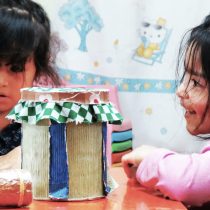
Mr. Director:
Poor emotional well-being in educational communities is one of the great consequences of this pandemic. The increase in teaching stress reaches 85% in a context of health emergency. In addition, 35% of caregivers, parents and guardians, have noticed a deterioration in the psychological well-being of children (Life in Pandemic Report, University of Chile and UNESCO).
There is an opportunity for change that is urgent, where well-being, from socio-emotional and intercultural education, positively impacts society. This involves addressing the great dilemma of today’s education: an 18th-century educational model, with 19th-century methodologies and 21st-century needs.
Atingente turns out to review our own country memory, from the perspective of the Andean worldview, which proposes well-being from the “Good Living” or “Sumak Kawsay”, that is, the relationship we have with ourselves and with the rest of the links that we generate throughout life, prioritizing interaction with all elements of nature, including human beings. The invitation is to be part of a new education, more human, integral, multidimensional and intercultural, where the priority is the student as the protagonist of his own learning, and the teacher a facilitator of transformative experiences as an agent of change, which promote a culture of well-being for the citizens of the 21st century.
Carolina Albornoz,
CEO of Caserta Foundation





